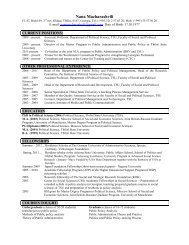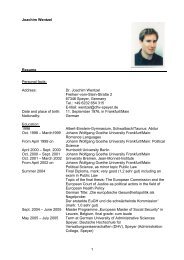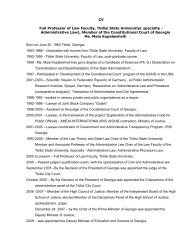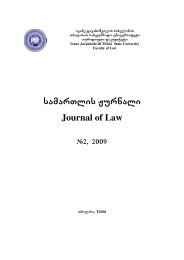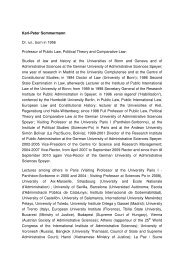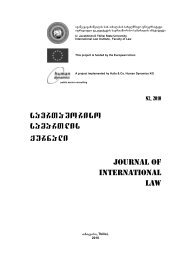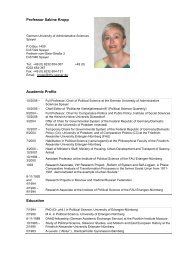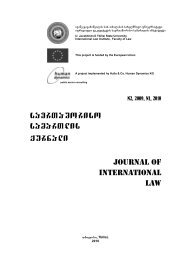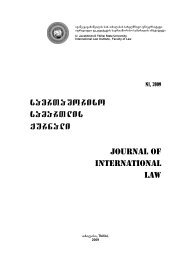Untitled
Untitled
Untitled
You also want an ePaper? Increase the reach of your titles
YUMPU automatically turns print PDFs into web optimized ePapers that Google loves.
saerTaSoriso samarTlis Jurnali, #1, 2008 JOURNAL OF INTERNATIONAL LAW, N1, 2008<br />
appointing more judges and court staff, the<br />
applicant had to wait nearly ten years before<br />
the “criminal charge” against him was the subject<br />
of a judicial determination at first instance.<br />
68<br />
It is evident from the aforementioned that<br />
the European Court set a very high standard.<br />
Each of the measures undertaken by a State<br />
shall be assessed based on its effectiveness<br />
with regard to the applicant. The subject of<br />
any given application is not the review of the<br />
general policy of a state, but the concrete fact<br />
of violation committed by the State. Even in<br />
the case if a reform was in principle successful,<br />
but it could not improve the applicant’s situation,<br />
referring to it will not be grounded.<br />
There are precedents, in which the Court<br />
held no violation of Article 6, as the protractions<br />
in the proceedings caused by the State<br />
bodies were not considered to be lengthy.<br />
For instance, in the case Neumeister v.<br />
Austria the Court held that Mr. Neumeister had<br />
not been interrogated during the fifteen<br />
months, there were no confrontation of witnesses<br />
and other investigative actions undertaken.<br />
The consideration of case commenced<br />
in a year after the finalizing the investigation.<br />
Despite all this, the European Court has not<br />
considered these facts to be sufficient for finding<br />
that the terms were violated. The Government<br />
noted that the delays were in large part<br />
caused by the need to give the legal representatives<br />
of the parties and also the judges<br />
sitting on the case time to get acquainted with<br />
the case record, which comprised twenty-one<br />
volumes of about five hundred pages each.<br />
Over seven years had elapsed between the<br />
time Neumeister was originally charged and<br />
the time when the Strasbourg Court was considering<br />
his application, and he did not yet had<br />
a judgment of conviction or acquittal. 69<br />
We consider that in this case the dissenting<br />
opinion of the Judge Zekia shall be taken<br />
into consideration: “Notwithstanding the difficulties<br />
encountered in the preparation and<br />
presentation of the case I am unable to persuade<br />
myself - even after making certain allowances<br />
for the delays caused by the necessity<br />
for these long investigations and the difficulties<br />
of procuring evidence - that such a long<br />
interval and delay between the date Neumeister<br />
was originally charged and the date of the<br />
conclusion of his trial, could be considered as<br />
compatible with the letter and spirit of Article 6<br />
(1) of the Convention…”<br />
We consider, that a feeling that a human<br />
being has, while awaiting a verdict, can not<br />
be assessed and delaying his being in such<br />
an uncertain condition for even very short<br />
time period is a violation and respectively shall<br />
involve the responsibility of state bodies.<br />
As it is evidenced from the Court case law<br />
review, the issue of duration of the proceedings<br />
is problematic in a number of states. The<br />
reasons causing it often diverse:<br />
“The States are held accountable for the<br />
actions of the civil and administrative bodies,<br />
that is expressed in the following: the established<br />
registration procedures, postponing the<br />
court hearing and protractions, which are<br />
caused due to the lack of staff in the administrative<br />
bodies”. 70<br />
“Protraction of the civil proceedings includes<br />
the following: postponing the delivery<br />
of the decision until the judgment is delivered<br />
on another case, postponing the court hearing<br />
or the submission of the evidence by a<br />
state, the delays caused due to the fault of<br />
the registry of other administrative bodies”. 71<br />
“In the criminal proceedings they include:<br />
movement of the case between the courts,<br />
hearing a case of two or more defendants at<br />
once, handing the verdict to the sentenced”. 72<br />
For the purpose of implementing all the<br />
obligations undertaken by states upon the ratification<br />
of the Convention it is necessary to<br />
arrange the judicial system in line with the requirements<br />
of Article 6(1).<br />
“The Convention obliges the states parties<br />
to organize the legal systems in a manner<br />
to allow the courts to fulfill the requirement of<br />
Article 6(1). The state is not only responsible<br />
for the specific violations due to the fact that it<br />
could not swiftly administer justice, but also<br />
due to not increasing the resources despite<br />
the fact that the courts are overloaded and<br />
there is no structure created, that as a result<br />
causes protraction”. 73<br />
CONCLUSION<br />
In order to make the legislation and the<br />
practice of our country in line with the requirement<br />
of the “reasonable time”, a number of<br />
measures shall be undertaken by the state<br />
bodies.<br />
In particular, the following legislative gaps<br />
shall be filled up: Chapter II of the Criminal<br />
Procedure Code of Georgia – “The Principles<br />
124



